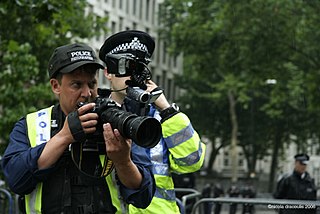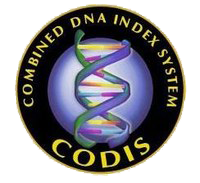Related Research Articles

Law enforcement in the United Kingdom is organised separately in each of the legal systems of the United Kingdom: England and Wales, Northern Ireland and Scotland. Most law enforcement is carried out by police officers serving in regional police services within one of those jurisdictions. These regional services are complemented by UK-wide agencies, such as the National Crime Agency and the national specialist units of certain territorial police forces, such as the Specialist Operations directorate of the Metropolitan Police.

A criminal record, police record, or colloquially RAP sheet is a record of a person's criminal history. The information included in a criminal record and the existence of a criminal record varies between countries and even between jurisdictions within a country. In most cases it lists all non-expunged criminal offences and may also include traffic offences such as speeding and drunk driving. In some countries the record is limited to actual convictions, while in others it also includes arrests, charges dismissed, charges pending and charges of which the individual has been acquitted.

The Serious Organised Crime Agency (SOCA) was a non-departmental public body of the Government of the United Kingdom which existed from 1 April 2006 until 7 October 2013. SOCA was a national law enforcement agency with Home Office sponsorship, established as a body corporate under Section 1 of the Serious Organised Crime and Police Act 2005. It operated within the United Kingdom and collaborated with many foreign law enforcement and intelligence agencies.
In the United Kingdom, the Violent and Sex Offender Register (ViSOR) is a database of records of those required to register with the police under the Sexual Offences Act 2003, those jailed for more than 12 months for violent offences, and those thought to be at risk of offending. In response to a Freedom of Information request in 2009, for example, Greater Manchester Police reported that of 16 people in their area placed on ViSOR since 2007 on their initiative and not as a result of a relevant conviction, four (25%) had clean criminal records.
The Police National Computer (PNC) is a database used by law enforcement organisations across the United Kingdom and other Non-Law Enforcement Agencies. Originally developed in the early 1970s, PNC1 went 'live' in 1974 providing UK police forces with online access to the Lost/Stolen vehicle database. The vehicle owners application quickly followed giving the police online access to the names/addresses of every vehicle owner in the UK. The Police National Computer started holding nominal information based on the computerisation of criminal records held by the Metropolitan Police and other police forces in the late 1970s. These CRO records could be accessed online in real-time by all UK police forces via the "Names" applications. it now consists of several databases available 24 hours a day, giving access to information of national and local matters. As of 18 January 2021, Kit Malthouse said that there are 13 million person records, 58.5 million driver records, and 62.6 million vehicle records stored on the PNC. The PNC is currently directly managed by the Home Office. Between 2007 and 2012, it was maintained by the National Policing Improvement Agency (NPIA) which inherited the activities of the now disbanded Police Information Technology Organisation (PITO).
The United Kingdom National DNA Database is a national DNA Database that was set up in 1995. In 2005 it had 3.1 million profiles and in 2020 it had 6.6 million profiles. 270,000 samples were added to the database in 2019–20, populated by samples recovered from crime scenes and taken from police suspects. 124,000 were deleted for those not charged or not found guilty. There were 731,000 matches of unsolved crimes between 2001 and 2020.

Police intelligence refers to an element of the British police. Staffed by police officers and support staff, its purpose is to track and predict crime with a view to curbing it. It is an emerging field that gained momentum after the National Criminal Intelligence Service (NCIS) launched the National Intelligence Model, which formalised the contribution intelligence makes to policing. There are also intelligence units at divisional level (DIU).
Criminal intelligence is information compiled, analyzed, and/or disseminated in an effort to anticipate, prevent, or monitor criminal activity.

Essex Police is a territorial police force responsible for policing the county of Essex, in the East of England. Essex Police is responsible for a population of over 1.8 million people and an area of 1,420 square miles (3,700 km2).

Forward Intelligence Teams (FITs) are two or more police officers who are deployed by UK police forces to gather intelligence on the ground and in some circumstances, to disrupt activists and deter anti-social behaviour. They use cameras, camcorders and audio recorders to conduct overt surveillance of the public. An unsuccessful legal challenge has been made against their use of overt surveillance, but in 2009 the Court of Appeal ruled that they must justify retention of photographs on a case-by-case basis. Any retained information is recorded on the Crimint database.
Child Exploitation Tracking System (CETS) is a Microsoft software based solution that assists in managing and linking worldwide cases related to child protection. CETS was developed in collaboration with law enforcement in Canada. Administered by the loose partnership of Microsoft and law enforcement agencies, CETS offers tools to gather and share evidence and information so they can identify, prevent and punish those who commit crimes against children.
A government database collects information for various reasons, including climate monitoring, securities law compliance, geological surveys, patent applications and grants, surveillance, national security, border control, law enforcement, public health, voter registration, vehicle registration, social security, and statistics.
A DNA database or DNA databank is a database of DNA profiles which can be used in the analysis of genetic diseases, genetic fingerprinting for criminology, or genetic genealogy. DNA databases may be public or private, the largest ones being national DNA databases.

The Behavioral Science Unit (BSU) is the original name of a unit within the Federal Bureau of Investigation's (FBI) Training Division at Quantico, Virginia, formed in response to the rise of sexual assault and homicide in the 1970s. The unit was usurped by the Critical Incident Response Group (CIRG) and renamed the Behavioral Research and Instruction Unit (BRIU) and currently is called the Behavioral Analysis Unit (5) (BAU-5) within the National Center for Analysis of Violent Crime (NCAVC). The BAU-5 currently works on developing research and then using the evidence-based results to provide training and improve consultation in the behavioral sciences—understanding who criminals are, how they think, why they do what they do—for the FBI and law enforcement communities.
Covert policing in the United Kingdom are the practices of the British police that are hidden to the public, usually employed in order that an officer can gather intelligence and approach an offender without prompting escape.

The National Crime Agency (NCA) is a national law enforcement agency in the United Kingdom. It is the UK's lead agency against organised crime; human, weapon and drug trafficking; cybercrime; and economic crime that goes across regional and international borders; but it can be tasked to investigate any crime. The NCA has a strategic role as part of which it looks at serious crime in aggregate across the UK, especially analysing how organised criminals are operating and how they can be disrupted. To do this, it works closely with regional organised crime units (ROCUs), local police forces, and other government departments and agencies.

The Code of Criminal Procedure commonly called Criminal Procedure Code (CrPC) is the main legislation on procedure for administration of substantive criminal law in India. It was enacted in 1973 and came into force on 1 April 1974. It provides the machinery for the investigation of crime, apprehension of suspected criminals, collection of evidence, determination of guilt or innocence of the accused person and the determination of punishment of the guilty. It also deals with public nuisance, prevention of offences and maintenance of wife, child and parents.

The Combined DNA Index System (CODIS) is the United States national DNA database created and maintained by the Federal Bureau of Investigation. CODIS consists of three levels of information; Local DNA Index Systems (LDIS) where DNA profiles originate, State DNA Index Systems (SDIS) which allows for laboratories within states to share information, and the National DNA Index System (NDIS) which allows states to compare DNA information with one another.

Capital punishment in Macau was formally abolished in 1976 and reiterated in the Penal Code of Macau in the 1995.

The New York City Police Department (NYPD) actively monitors public activity in New York City, New York, United States. Historically, surveillance has been used by the NYPD for a range of purposes, including against crime, counter-terrorism, and also for nefarious or controversial subjects such as monitoring political demonstrations, activities, and protests, and even entire ethnic and religious groups.
References
- ↑ "Corrupt policeman blackmailed sex offenders". The Telegraph. London. 9 December 2008.
- 1 2 Lewis, Paul; Vallée, Marc (7 March 2009). "Revealed: police databank on thousands of protesters". The Guardian. London. pp. 1–2. Retrieved 10 March 2009.
Police are targeting thousands of political campaigners in surveillance operations and storing their details on a database
- ↑ "Metropolitan Police Authority: Crimint Plus Project – contract award approval". 23 June 2005. Archived from the original on 7 November 2009.
- ↑ http://www.newstatesman.com/200309150014 Caught on camera Matt Salusbury New Statesman 15 September 2003
- ↑ "Policeman accused of blackmail". The Independent. 9 December 2008. Retrieved 9 November 2022.